| Article ID | Journal | Published Year | Pages | File Type |
|---|---|---|---|---|
| 3274608 | Médecine des Maladies Métaboliques | 2015 | 11 Pages |
Abstract
As type 2 diabetes (T2DM) progresses, most patients eventually require insulin; around 20% of the T2DM population is treated with insulin. Whether oral antidiabetics should be retained when starting insulin is still a matter of debate, except for metformin. In particular, the question arises with the newer agents, such as dipeptidylpeptidase-4 inhibitors (DPP4-i). among the classic limitations with insulin use in T2DM patients, hypoglycemia remains the major barrier to good glycemic control, along with weight gain exacerbation. DPP4-i improve glycemic control by increasing the glucose sensitivity of both the α- and β-pancreatic cells and thus do not expose to the risk of hypoglycemia, and are weight neutral. In addition to these expected benefits on hypoglycemia and weight, combining them with insulin could limit insulin dose and regimen complexity. In addition, DPP4-i decrease postprandial glycemic excursions that are not properly addressed by basal insulin and metformin even after optimizing insulin titration. as data with DPP4-i in insulin-treated T2DM patients become available, our objective is to provide a comprehensive overview of the current evidence from controlled randomized trials, and to discuss the mechanisms associated with their potential benefit of in this setting.
Keywords
Related Topics
Health Sciences
Medicine and Dentistry
Endocrinology, Diabetes and Metabolism
Authors
S. Halimi, B. Charbonnel, P. Monguillon, S. Dejager,
